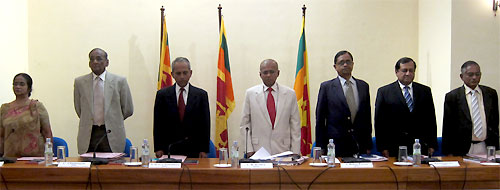|
Win-Win solution on the middle path
Daily Mirror Editorial Jan 4, 2011 | |
 One of the crucial issues in the first few weeks and months of 2012 will be the way in which the government responds to the positive recommendations made in the historic 400-page report of the Lessons Learnt and Reconciliation Commission (LLRC). Largely because of the bad record of most of the former commissions or committees whose recommendations were either partial or not implemented, many independent observers and leading western countries had been skeptical because the Commission had been appointed by the President. But the LLRC headed by former Attorney-general C.R. de Silva made some dramatic and powerful recommendations which if implemented efficiently and sincerely could change the face of Sri Lanka. The LLRC has recommended that if Sri Lanka is to be rebuilt on a solid foundation, there must be a tri-lingual policy with Sinhala, Tamil and English given equal place. The Commission has recommended that reference to race be removed from all official documents except at a national census. This will help in restoring a Sri Lankan identity as in the United States or India where people from different states though they are of different races, refer to themselves as Americans or Indians and not by their race. The LLRC has also said that Sri Lanka is in a situation where people are forced to depend on politicians to obtain even their basic needs though the constitution proclaims that the people are sovereign and their elected politicians should be the servants of the people. The LLRC has said priority should be given to address the grievances and aspirations of the Tamil-speaking people through devolution of power to the Northern and Eastern provinces. The failure by successive governments to address these grievances and aspirations led to the thirty-year ethnic war in which hundreds of thousands of people were killed, injured or left to languish in different degrees of displacement, destitution and despair. Terrorism was crushed in May 2009 but if the causes for it are not addressed effectively and urgently something worse could befall the country. With India and China having so much influence and power over Sri Lanka, some independent analysts do not rule out the possibility of these regional super powers carving out Sri Lanka for themselves and to achieve their geo-political agendas. It is in such a situation that the government is to hold further talks with the Tami-national Alliance (TNA) on January 17, 18 and 19 in a bid to find a just and fair political solution to the ethnic conflict. Minister Nimal Siripala De Silva who leads the government delegation for the talks with the TNA told the Sunday Times the government was ready to work out some compromise on giving land powers to the provincial councils. The TNA backed by India is demanding police powers also but President Rajapaksa is ruling out this possibility. If an accommodation is to be reached on the middle path and on a win-win basis the extremists on both sides must be isolated. The terrorist extremists on the Tamil side have been crushed though the international Tiger Diaspora is still influential. The Rajapaksa regime must now put the wellbeing of the whole country before party politics or personal survival. It must have the courage to marginalize extremists in the South if it wants to build true and lasting peace with justice in a multi-religious and multi-racial Sri Lanka where there is deep unity in diversity. Source: Daily Mirror - Sri Lanka
|
|